The Russians fleeing Putin’s military draft
Russians escape the country in the wake of Putin’s military mobilisation.
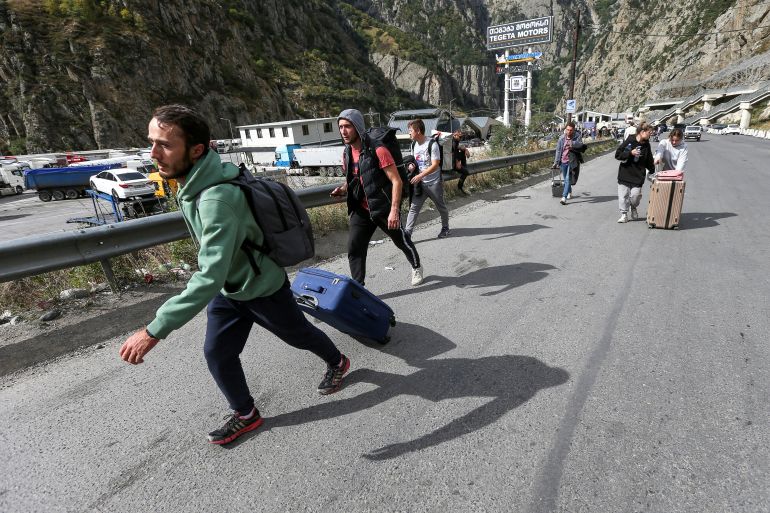
Russian President Vladimir Putin’s decision to call up 300,000 military reservists to join the war in Ukraine has created chaos in the country.
Keep reading
list of 4 itemsAfter months of violence, Brazil chooses their new leader
What do Russians think of the war in Ukraine?
Russia and Ukraine’s war over grain
While men are being summoned to the front lines to fight in the war on short notice, others are fleeing the country to escape the draft.
We talk to some of them.
In this episode:
- Albert, Russian draft resister
- Andrey, Russian draft resister
- Hoelun, Russian draft resister
- Bernard Smith (@JazeeraBernard), Al Jazeera correspondent
Connect with us:
@AJEPodcasts on Twitter, Instagram, and Facebook
Full episode transcript:
This transcript was created using AI. It’s been reviewed by humans, but it might contain errors. Please let us know if you have any corrections or questions. Our email is TheTake@aljazeera.net.
Albert: It’s strange to think that your life now is subject to, such a hard decision between, jail, mobilisation or being a refugee.
Halla Mohieddeen: That’s Albert, a Russian anti-war activist talking about the choice he faced earlier this month, when President Vladimir Putin announced he’d be drafting Russians to join the war effort against Ukraine.
Newsreel: Russian President Vladimir Putin is calling up reservists to fight in the war in Ukraine. He made the announcement during a rare address in the nation.
Halla Mohieddeen: Since the announcement, there have been chaotic scenes around Russia. Men are being summoned to join the army in droves – in many cases being taken from their homes at short notice.
Newsreel: An estimated 50,000 Russians have landed in Belgrade since war broke out in February – many on one-way tickets.
Halla Mohieddeen: Others, like Albert, are trying to flee the country. There have also been some protests against Putin’s decision. But with the Kremlin’s tight control on dissent, it’s hard to know just how much opposition there is. Does the war still have popular support, or could Putin’s mobilisation backfire against him?
[THEME MUSIC PLAYING]
Halla Mohieddeen: I’m Halla Mohieddeen, and this is The Take.
[THEME MUSIC PLAYING]
Halla Mohieddeen: Millions of Russians are grappling with the very real possibility they could find themselves on the front lines. But for Albert, the anti-war activist, the choice was clear.
Albert: There are not very much options for me because I belong to the first category of those who [are] subjected to mobilisation. I served in Russian Army 11 years ago. I am 31 years old. And I’m healthy. I was in a great danger and the decision was for me, very obvious.
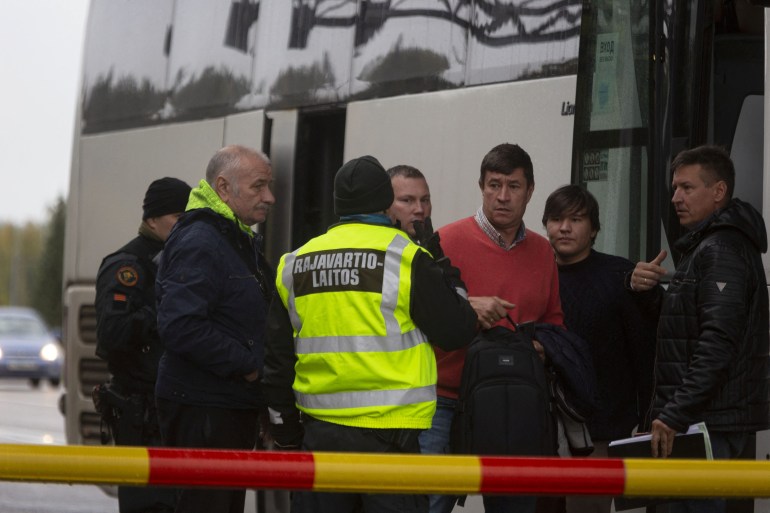
[MUSIC PLAYING]
Halla Mohieddeen: Rumours of the potential mobilisation had been swirling for a while – and so Albert had been planning ahead of time. He saw signs an announcement was imminent, and bought a ticket to Turkey – just in the nick of time.
Albert: Two hours later I heard the news that Putin the next morning will address the nation.
Vladimir Putin: To all citizens of different generations, ages, nationalities, ethnic origins to unite us with this great historic Russia soldiers officers, volunteers who are now fighting.
Halla Mohieddeen: The announcement – to call up 300,000 military reservists, made Albert nervous. Even though he already had a ticket out of Russia – he moved the date up.
Albert: I’ve understood at that moment that I have not such many days. That maybe borders will be closed the next day. It was really panic. Because all that two days between Putin’s announcement and between my departure, I wasn’t thinking about going to Turkey, Istanbul – of escaping. I was thinking about death.
Halla Mohieddeen: Albert said he feared that when he tried to leave the country, he’d be faced with a choice between joining the army, or going to jail.
Albert: I was preparing myself for the jail. I didn’t believe that the officers on the borders of Russia will let me pass.
Halla Mohieddeen: He was anxious and alert as he and a group of other men reached the immigration counter.
Albert: The officer took in his hand all our passports and he asked did you serve in the army? Did you receive a mobilisation document? Then he asked when you bought the ticket? I cross their passport control station and I have understood that, oh, oh I think I’ve survived.
[MUSIC PLAYING]
Halla Mohieddeen: Like Albert, the man you’re about to hear from is a Russian who has left the country in the past week because he didn’t want to risk being drafted into a war he doesn’t support. For privacy reasons, we’ll call him Andrey.
Andrey: I didn’t want to take part in all these military reactions and I didn’t want to take a gun and go and kill people, innocent people for, I don’t know what reasons.
Halla Mohieddeen: Andrey was an editor for Russian state media. But after the mobilisation was announced, he decided to leave everything behind. He’s now in Georgia.
Andrey: Only like a week ago, I could leave my job in Russian state news agency because I didn’t want to work for propaganda anymore.
It was difficult because I left my wife there. I left my flat there, I left my car, I left my cat, I left my parents, and I just, I just left the country where I wanted to work and where I wanted to improve and where I wanted to be.
Halla Mohieddeen: Andrey and Albert are far from the only ones. Russians who have the means have been fleeing the country at various border points, to wherever they can go.
Newsreel: It was a successful trip across the border for these Russians arriving in Finland.
Newsreel: Russian citizens are also trying to enter Georgia via plane.
Newsreel: Long queues build up at the Vishnevka border crossing from Russia to Kazakhstan, as thousands continue to flee a possible call-up for the war in Ukraine.
Halla Mohieddeen: In the far east Siberian region of Buryatia, many have crossed into Mongolia. We managed to speak to a woman we’ll call Hoelun, to protect her identity.
Hoelun: The announcement came that the mobilisation is starting and my mom just called and said ok, pack your things and dad and I will take you to the border and then you go by train. So we just put all the basic things in our suitcase.
Halla Mohieddeen: The “we” Hoelun is referring to is her and her boyfriend. They decided to leave before he could be drafted.
Hoelun: He would be the first one to go, because he served in 2016 for a year, like all men have to do in Russia. So we don’t want any part in this war. It’s a criminal war. It’s wrong and we don’t want to be in it. So we had to go. We spent five hours on the border and then we crossed it. It was very I don’t know – it was very nervous there. Like we fear that my boyfriend could be handed this draft notice on the border.
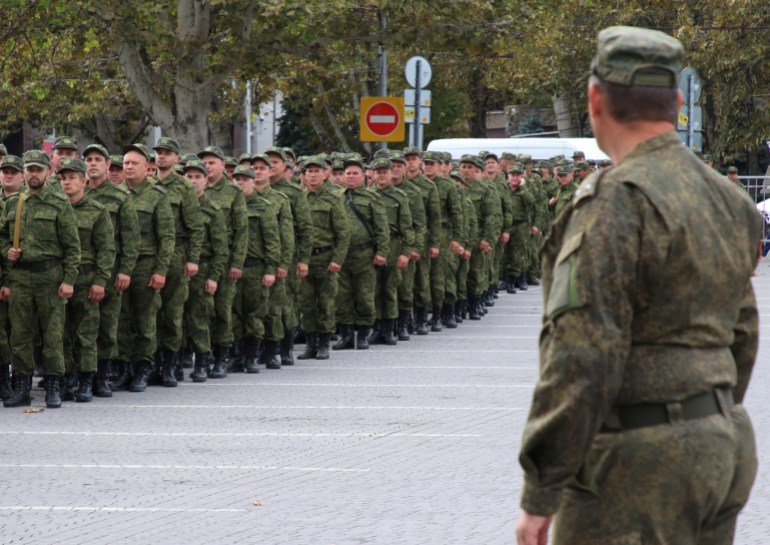
[MUSIC PLAYING]
Halla Mohieddeen: That didn’t happen. Hoelun and her boyfriend made it safely to Mongolia. But for those left behind, the threat remains – particularly in Buryatia. It’s a largely rural, and relatively impoverished part of the country, and people from Hoelun’s ethnic Buryat community are being targeted to join the war, regardless of their military experience.
Hoelun: My cousin received this draft note. Although they were promised that they would be like reserved for work. Like they wouldn’t go. But they still brought these papers to his work and he was lost. Because he didn’t serve in the army in the first place and he doesn’t have any combat experience and he also has two daughters and he doesn’t want to go to war.
Halla Mohieddeen: Videos have circulated online of men allegedly being taken to draft centres, being made to join the fight. In some instances there has also been defiance – in one case, a man even opened fire at a recruiting centre in protest of the mobilisation.
[SOUNDS OF GUNSHOT AND SCREAMING]
Halla Mohieddeen: But for the most part, especially in rural areas of Buryatia – there’s a feeling of resignation, that they’ve no choice but to go to the front lines.
Hoelun: They mostly come to villages, to rural areas, where there are just like two or three streets with a population of like 100 they could take up to 30 men, like all men. I’ve seen posts on Instagram with photos of old men, who certainly never served in the army. And they like couldn’t resist. Maybe they don’t have resources to leave. And they’d rather stay because they hear that they would be called like a traitor or something.
Halla Mohieddeen: And for Hoelun, there’s an irony in the fact that members of her community – one that’s often discriminated against and not seen as truly Russian – are disproportionately dying as soldiers in the war.
Hoelun: Even though they say that Russia is a multiethnic country, racism and discrimination, they are entrenched in our society. Like, it’s really hard to find a person who would agree to rent an apartment to someone who’s not Slavic in the western part of Russia.
So when a war suddenly breaks out, we’re suddenly all Russians, although in our daily life we’re not. All of the burden of this mobilisation, it falls on the poor ethnic minority regions, Buryatia, Kalmykia, Dagestan. And it’s very unfortunate because I don’t know, people suffer in these regions and when someone has to die they go first.
[MUSIC PLAYING]
Halla Mohieddeen: After the break, where is the war headed next?
[SOUNDS OF PROTESTS]
Halla Mohieddeen: As people like Albert, Andrey and Hoelun leave the country, there have also been some protests against the mobilisation. To get a sense of how significant that opposition might be, I spoke to Al Jazeera’s Bernard Smith.
Bernard Smith: I’m Bernard Smith. I’m a correspondent for Al Jazeera English. I’ve spent a fair bit of time, certainly in the last 12 months, in Russia. I was there really for most of the beginning of the year, certainly all through that time when Vladimir Putin launched his invasion.
Halla Mohieddeen: What’s the sense you’re getting now in the country? Because things have changed in the last couple of weeks, haven’t they, what with this new announcement from Vladimir Putin with what he calls a “partial mobilisation”? Has that changed the dynamics somewhat?
Bernard Smith: We’ve been seeing, as soon as he announced that partial mobilisation people received – men received their call-up papers. Now, we saw some protests in different cities in Russia, or complaints outside military centres.
[SOUNDS OF PROTESTS]
Very brave individuals because I’ve been at protests in Moscow. I’ve seen how the police as soon as somebody stands there and even tries to look like they’re a protester, they’re dragged off the streets.
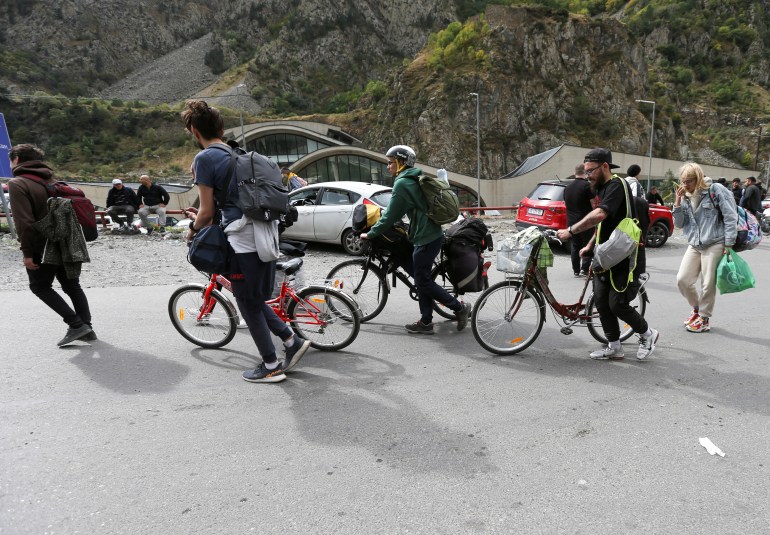
[MUSIC PLAYING]
Bernard Smith: So the fact that people have been prepared to go out and protest, it’s very small numbers because of, as I say, the courage it takes. This shows I think that there is, perhaps, the start of some sort of manifestation of some sort of concern that this is now hitting home for Russians. Until this call-up, most Russians, certainly the ones when I was there that we spoke, to tried to pretend that this wasn’t going on. They tried to put it out of their minds. But now when family members, when sons and fathers are being called up, Russians are being forced to recognise that this “special operation”, as the Kremlin calls it, is affecting them.
Halla Mohieddeen: What do we know about this partial mobilisation? How partial is it? Do a lot of people suspect that this could go wider than the initial 300,000, or up to a million?
Bernard Smith: Because this is still, according to the Kremlin, a special military operation – Vladimir Putin still has not declared that this is a war – then there is still this feeling even though men are now being called up, that this is not a war. People are trying to pretend that is not the case. But there is a recognition in Russia, this has not gone how the Kremlin thought it was going to go. And I was there in Russia right at the beginning of this invasion. We were reporting that Vladimir Putin was telling Ukrainian soldiers, this will be over quicker if you lay down your arms, surrender to Russian forces because the Kremlin expected, and everybody was given the impression, that this was all gonna take a few days. We know, and Russians know, that it is dragging on much, much longer than that.
Newsreel: The war in Ukraine has entered its seventh month with no end in sight to what Moscow calls its special military operation.
Bernard Smith: And there is a gathering fear that the more and more troops are called up, the more it’s clear that Vladimir Putin is determined to get something out of this rather than pull back. And we know when we’ve been reading that, for example, Putin is taking more of a – he is getting more involved in the day-to-day strategy. Where the Russian military leaders have wanted to withdraw from places, Putin has said they can’t withdraw. It’s very far from over, but it’s obviously going to be a massive struggle for Russia. But it’s clear that the Kremlin so far hasn’t had to worry about the mounting numbers of deaths. They’re not honest about them. There’s not protests about them on the streets. The Kremlin so far has been able to increase the numbers of conscripts and not worry about how many people are being killed.
[MUSIC PLAYING]
Halla Mohieddeen: In terms of the reaction we’re seeing you, you’ve mentioned how brave people need to be to stand up and protest and voice opposition to this, given the penalties that come with taking action like that. But there are still protests happening. People are fleeing the country. Do you read this as an indication that Putin has misjudged the mood of the Russian public?
Bernard Smith: No, I don’t think so yet. It’s again, Halla, it’s so hard to say exactly what people think because of the difficulty in canvassing opinion. But the polls just before the call that was announced gave this sort of steady percentages. It’s been since March really, of Russians in favour of what Vladimir Putin was doing in Ukraine because the Russian government, the Kremlin has categorised this as a fight against Nazis, and it’s not. There’s not a fight against Nazism, but that’s how they’ve categorised it. Russians believe it. So with the almost complete control of the Kremlin over the narrative in Russia, with no access to any other news, unless you get a VPN, a virtual private network, so you can bypass block sites and access sites outside Russia. Unless you can do that, everybody gets it off the TV. And so with such strong and total control of the narrative, there isn’t any indication yet that the Kremlin is losing Russians.
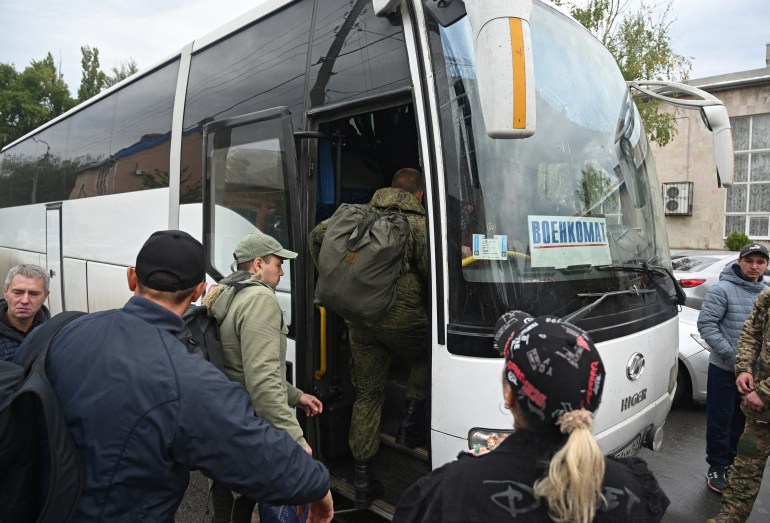
[MUSIC PLAYING]
Halla Mohieddeen: That’s something Albert can attest to. Within his own family, his mother was supportive of him leaving, but his father, who supports the war, was not.
Albert: He’s a very loyal recipient of propaganda. He’s dreaming about the defeat of Ukraine, of NATO, of America. He called me a betrayer and he told me that if he were younger, he will go to the front, to the army.
Halla Mohieddeen: As he starts a new life in Turkey, the political divide with his father has added to a sense of disconnect Albert feels from Russia.
Albert: I view my country now as a black hole devouring all people. It’s like there is no society anymore, no order anymore. I feel connected only with those who are trying to survive now. Not with such fascist persons like my father and all that loyal supporters, all the authority.
Halla Mohieddeen: In Mongolia, Hoelun’s life is also in flux, and she doesn’t know when she might be able to return home.
Hoelun: Of course I’m hoping that we go back one day because it was all of a sudden and we weren’t planning to leave like for such a long time. But for now, we are staying here in Mongolia.
We are allowed to stay here for 30 days. We’ll be going to South Korea for some time and then we’ll see where it goes.
Halla Mohieddeen: And that’s the Take. This episode was produced by Ashish Malhotra with Negin Owliaei with Ruby Zaman, Amy Walters, Chloe K. Li, Ashish Malhotra, Alexandra Locke, and me, Halla Mohieddeen. Alex Roldan is our sound designer. Aya Elmileik and Adam Abou-Gad are the Take’s engagement producers. And Ney Alvarez is head of audio. We’ll be back on Wednesday.
Episode credits:
This episode was produced by Ashish Malhotra with Negin Owliaei, Ruby Zaman, Chloe K Li, Amy Walters, Alexandra Locke, and our host Halla Mohieddeen. Alex Roldan is our sound designer. Aya Elmileik and Adam Abou-Gad are our engagement producers. Ney Alvarez is Al Jazeera’s head of audio.